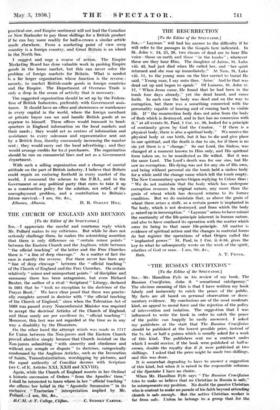THE RESURRECTION [To the Editor of-time SPECTATOR.] - SIR,—" Layman"
will find his answer to the difficulty if he will refer to the passages in the Gospels here indicated. In St. John v. 24, 25; 28, two classes of dead are to hear His voice—those on earth and those "in the tombs" ; wherever these are they hear Him. The daughter of Jairus, St. Luke viii. 42, had just died when He called her, and "her spirit returned and she rose up immediately." At Nain, St. Luke viii. 11, to the young man on the bier carried to burial He said, "Young man, I say unto thee, 'Arise.' And he that was dead sat up and began to speak:" Of Lazarus, St. John xi. 17, " When Jesus came, He found that he -had been in the tomb four days already," yet the dead heard, and came forth. In each case the body was dead and on the way to corruption, but there was a something connected with the personality capable of hearing and of coming back to visible life. If " the resurrection body does not arise from the body of flesh which is destroyed, and in fact has no connexion with it," at all events St. Paul, 1 Con xv. 38, looked for a principle of continuity given by God the Creator. "If there is a physical body, there is also a spiritual body." We receive the physical body at our birth, but it has to die and give place to our spiritual, and the death is due to sin, for if there is no sin yet there is a "change" So our Lord, the Sinless, was changed at a moment known to Him only, and His spiritual form taken on, to be manifested as He willed. But it was the same Lord. The Lord's death was for our sins, but He saw no corruption. His dying was not for any sin of His own, and being without personal sin the tomb _held a sinless body for a while until the change came which left the tomb empty. The New Commentary quotes Origen replying to Celsus thus : "We do not maintain that the body which has undergone corruption resumes its original nature, any more than the grain of wheat which has decayed returns . to its fortner condition. But we do Maintain that, as above the grain of wheat there arises a stalk, so a certain power is implanted in the body, which is -not destroyed, and from which the body i :3 raised up in ineorrupticin." "Layman" seems to have missed the continuity of the life.principle inherent in human nature, and also to have confused its operation with the matter which owes its being -to that same life-principle. All matter is evidence of spiritual action and the changes in material forms do but register the operations of what Origen called the "implanted power." St. Paul, in 1 Cor. 6-16,- gives the key to what he subsequently wrote on the work of the spirit,- whether of God or man.—I am, Sir, &c:,














































 Previous page
Previous page